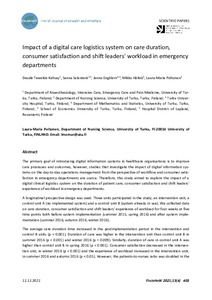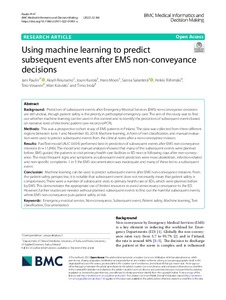Hae
Aineistot 1-4 / 4
Impact of a digital care logistics system on care duration, consumer satisfaction and shift leaders’ workload in emergency departments
<p>The primary goal of introducing digital information systems in healthcare organisations is to improve care processes and outcomes, however, studies that investigate the impact of digital information systems on the ...
Using machine learning to predict subsequent events after EMS non-conveyance decisions
<p><strong>Background: </strong>Predictors of subsequent events after Emergency Medical Services (EMS) non-conveyance decisions are still unclear, though patient safety is the priority in prehospital emergency care. The ...
An observational study of technical and non-technical skills in advanced life support in the clinical setting
<p>Objective<br>Technical skills (TS) and non-technical skills (NTS) are the primary elements ensuring patient safety during advanced life support (ALS) and effective crisis resource management (CRM). Both skills are needed to perform high-quality ALS, though they are traditionally practiced separately. The evidence of the association between NTS and TS in high-quality ALS performance is insufficient. Hence, we aimed to evaluate the association between the skills in real-life in-hospital ALS situations.</p><p>Methods<br>We video recorded real-life in-hospital ALS situations, analyzed TS and NTS demonstrated in them with an instrument measuring TS and NTS, and tested the linear association between NTS and TS using a linear mixed model.</p><p>Results<br>Among 50 real-life in-hospital ALS situations that we recorded, 20 had adequate data for analysis. NTS and TS total scores were associated with one another (slope 0.48, P < 0.001). All NTS subcategories were associated with the TS total score (slopes ranging from 0.29 to 0.39, P < 0.001). The NTS total score and TS subcategories (chest compression quality, ventilation quality, rhythm control and defibrillation quality) were associated with one another (slopes ranging from 0.37 to 0.56, P < 0.01).</p><p>Conclusions<br>The resuscitation teams who demonstrated good NTS also performed the technical aspects of ALS better. The results suggest that NTS and TS have an association with one another in real-life in-hospital ALS situations. NTS performance had the most evident association with chest compression quality and rhythm control and defibrillation quality; these are considered the most crucial elements affecting outcomes of ALS. The findings of the study present novel information of what and why to emphasize in ALS training.</p><p>Clinical trial registration. ClinicalTrials.gov, NCT03017144.</p>...
Randomized controlled trial comparing pit crew resuscitation model against standard advanced life support training
<p><b>Objectives </b>Pit crew models are designed to improve teamwork in critical medical situations, like advanced life support (ALS). We investigated if a pit crew model training improves performance assessment and ALS ...



